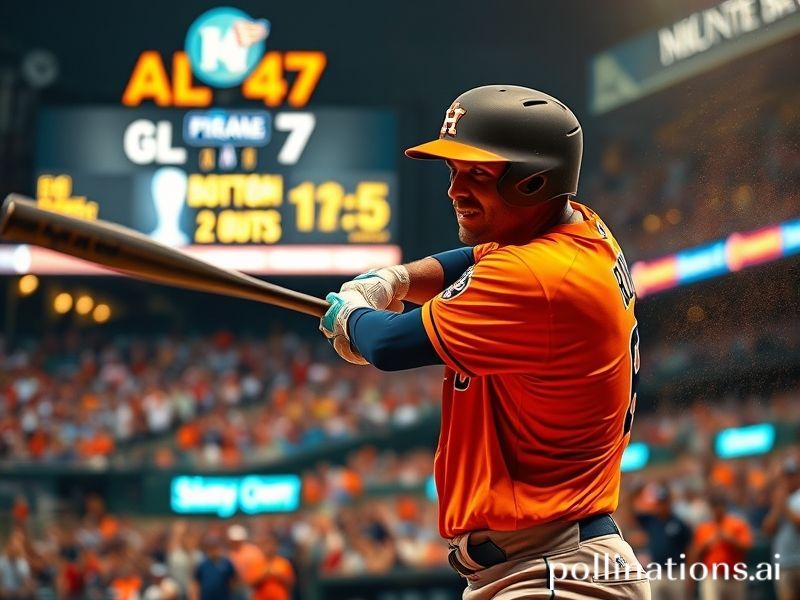Astros vs Braves: How One Baseball Game Became the World’s Most-Watched Distraction
Astros vs Braves: A Global Power Outage Disguised as a Baseball Game
By Diego Serrano, Dave’s Locker International Correspondent
Houston, Texas – Somewhere between the first pitch and the last corporate-sponsored wave, the Astros and Braves reminded the planet that even in an age of intercontinental hypersonic missiles and algorithmic romance, two groups of overpaid men in pajamas can still hijack the world’s attention for three hours. The final score—Astros 6, Braves 5—was less a number than a diplomatic communiqué confirming that America’s pastime still doubles as its soft-power opiate, available in 136 countries via the same streaming services that can’t quite deliver your paycheck on time.
Viewed from abroad, the contest looked like a geopolitical Rorschach test. In Seoul’s Gangnam sports bars, office drones clocked out early to watch José Altuve, a 5-foot-6 Venezuelan, slap line drives against Spencer Strider, a Georgian whose fastball travels faster than most EU agricultural subsidies. The Koreans, ever polite, applauded both sides; the Chinese social-media censors, less polite, quietly muted any posts comparing Strider’s velocity to the speed at which Hong Kong’s autonomy evaporated. Meanwhile, in Lagos, a data analyst pirated the feed on a flickering 4G connection and marveled that a country with 40 million citizens lacking reliable electricity can still stream 98-mph heaters without buffering—proof, perhaps, that American bandwidth priorities are as skewed as its foreign policy.
The game’s subplots were equally exportable. Yordan Álvarez, Cuba’s most successful defector since the 1959 sugar harvest, launched a 450-foot home run that cleared the batter’s eye and momentarily eclipsed the Chevron logo behind it—a fleeting victory of human muscle over fossil-fuel branding. Across the diamond, Atlanta’s Ronald Acuña Jr., representing a Venezuela that Washington routinely sanctions into nutritional penury, answered with a stolen base that reminded viewers that some forms of sanctioned speed are still legal. The irony was richer than the stadium queso, and twice as artificial.
Of course, no modern spectacle is complete without its digital shadow. The MLB’s geo-fenced blackout zones—those Kafkaesque patches of Earth where paying customers are punished for living too close to the action—sparked outrage from Toronto to Tegucigalpa. A Finnish cybersecurity consultant tweeted a step-by-step guide to VPN redemption, adding the hashtag #FreeTheFeed. Within minutes, the tweet had more retweets than Finland has residents, proving that nothing unites humanity like the desire to watch millionaires play catch without paying for it.
Then came the seventh-inning stretch, that uniquely American tradition of synchronized corporate karaoke. As 42,000 Texans belted out “God Bless America,” a bar in Dublin erupted in jeers, a pub in Tel Aviv toasted with ironic l’chaims, and a café in Cairo quietly changed the channel to Al-Jazeera’s coverage of Sudan’s actual war. The global consensus: if the empire insists on exporting its culture, it might at least update the playlist past 1918.
By the ninth inning, the international money trail had become its own subplot. DraftKings reported a 340 % spike in micro-bets from the Philippines, where offshore call-center workers wagered their lunch allowances on whether the next pitch would be a ball or a strike—micro-transactions that, in aggregate, could fund a week of Manila’s public transport. Somewhere in a London hedge fund, analysts ran Monte Carlo simulations to arbitrage the delay between satellite uplink and terrestrial cable, proving once again that capitalism can monetize even the speed of light.
When the final out landed in Jeremy Peña’s glove, fireworks erupted over Houston like budget North-Korean propaganda. In living rooms from São Paulo to Sydney, viewers switched off their devices and returned to inflation, wildfires, and the slow-motion collapse of whatever passes for civilization this week. The game had changed nothing—no tariffs lifted, no ceasefires brokered, no carbon un-emitted—yet for 180 commercial-studded minutes, the planet’s collective cortisol dipped below apocalypse level. Which, by 2024 standards, counts as a multilateral success.
Baseball, they say, is a metaphor for life. After careful diplomatic analysis, I can confirm the metaphor is accurate: long, occasionally thrilling, rigged by capital, and ultimately meaningless—unless you’re the one holding the TV remote.







